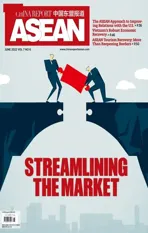FIGHTING FRAGMENTATION
2022-06-23

(Getty Creative)
A long push for a unified and open market has eventually crystallized into a national strategy.A catchphrase that quickly made the headlines has evolved into an indispensable facet of economic retooling amid the haze of domestic and global perplexity.
The imperative upgrade of China’s huge market from big to strong envisions breaking local protection and various entrenched sticking points that weigh on domestic flows of goods,services,capital,and labor.
Market segmentation is now arguably one of the highest priorities,and it is likely the result of the doubleedged sword of rivalry among regions over GDP growth and scale.The trend catapulted the country into the world’s second-largest economy status in just a few decades,but solidified a change-as-you-go approach to regional market oversight.
Transportation and logistics disruptions amid the Omicron outbreak in Shanghai in April coincided with the strategy announcement and were seen as justifying the push for a unified market.Without standardized rules to unify oversight over a gigantic highway network,the country’s transportation prowess could easily devolve into an annoying pain point blocking economic activity.
A slew of actions in the strategy’s wake have aimed to swiftly unblock transportation impasses.
Nonetheless,concerns remain over how effective the economy can redefine its market apparatus after decades of market segmentation.Thus far,few have been convinced that the unified market strategy will serve as a legally binding decree capable of penalizing persons,businesses,institutions,or government bodies in violation.
